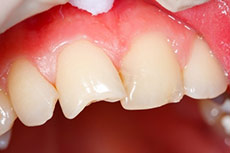What To Do If You Have a Dental Emergency in Chicago
May 5th, 2016
 You can’t always put off seeing the dentist. If you have a simple cavity, it’s easy to wait to see the dentist for a couple of days. A painful cracked tooth is another story. We’re here to help you figure out what you should do if you have a dental emergency in Chicago. The more prepared you are, the quicker you’ll be able to deal with any serious dental issues.
You can’t always put off seeing the dentist. If you have a simple cavity, it’s easy to wait to see the dentist for a couple of days. A painful cracked tooth is another story. We’re here to help you figure out what you should do if you have a dental emergency in Chicago. The more prepared you are, the quicker you’ll be able to deal with any serious dental issues.
What Are Dental Emergencies?
Just because you experience a little tooth pain or discomfort doesn’t mean you need to drop everything and see the dentist right away. Some dental issues require more immediate attention, whereas others can wait a few days or weeks. Here are some potential teeth problems that may be considered dental emergencies:
- Lost tooth
- Knocked-out tooth
- Loose tooth
- Tooth that’s moved out of alignment
- Chipped tooth that’s in pain
- Fractured or cracked tooth
- Serious tissue injury inside your mouth
- Acute teeth, gum or tissue pain
- Continuous bleeding from tissues inside your mouth
- Infection inside your mouth
What To Do If You’re Experiencing a Dental Emergency in Chicago
If you have a dental emergency in Chicago, you need to see a dentist right away. This is why we Water Tower Dental Care offers 24/7 emergency dental care to our patients on The Magnificent Mile. All you have to do is give us a call and we’ll take care of the rest. If you call us outside of normal office hours, please listen to the recording on our voicemail and follow the instructions. Emergency calls are answered at all hours of the day, as is emergency dental care.
CEREC One-Visit Crowns
One of the most common dental emergencies at Water Tower Dental Care is a cracked, chipped or fractured tooth. Whether you crack your tooth on food or knock your tooth against something, this type of injury can cause serious pain. A broken tooth can also cause your nerves to be exposed to dangerous bacteria, which can cause dangerous infection.
We can treat this issue quickly and effectively with a CEREC One-Visit Crown, alleviating your pain and providing you with a full tooth again. Using our CEREC technology, we can perfectly fit, craft and place your crown, inlay or onlay in just one hour. It’s the perfect solution to a painful dental emergency.
Experiencing a dental emergency? Call us right now. If you’re calling during us during our off-hours, please follow the simple instructions in the recording you hear. We provide emergency dental care in Chicago 24 hours a day, seven days a week.

 Everyone in Chicago knows that the city’s winter weather can be hard on your commute, skin and nose. But extremely cold weather can also affect your teeth and mouth. Many Chicagoans experience uncomfortable sensations or even extreme pain in their mouth while in icy weather. Let’s take a look at why that happens and what you can do to keep your teeth and mouth feeling great all winter long!
Everyone in Chicago knows that the city’s winter weather can be hard on your commute, skin and nose. But extremely cold weather can also affect your teeth and mouth. Many Chicagoans experience uncomfortable sensations or even extreme pain in their mouth while in icy weather. Let’s take a look at why that happens and what you can do to keep your teeth and mouth feeling great all winter long! Repairing a chipped tooth is usually not as hard as one would imagine. Through several different processes, depending on the severity of the chipped tooth, a dentist can make your smile look good as new.
Repairing a chipped tooth is usually not as hard as one would imagine. Through several different processes, depending on the severity of the chipped tooth, a dentist can make your smile look good as new. Whether you took a bite into something too hard for your tooth, or took a nasty spill, the potential to crack, fracture or chip your tooth is possible. Thankfully, there are several ways to fix a chipped tooth depending on the severity of the accident.
Whether you took a bite into something too hard for your tooth, or took a nasty spill, the potential to crack, fracture or chip your tooth is possible. Thankfully, there are several ways to fix a chipped tooth depending on the severity of the accident.




 Website Powered by Sesame 24-7™
Website Powered by Sesame 24-7™